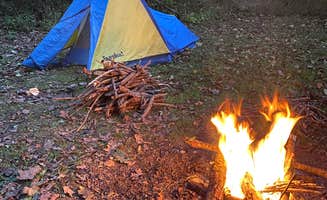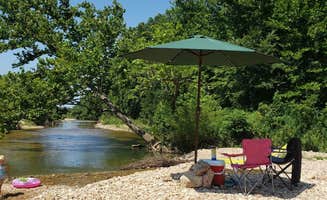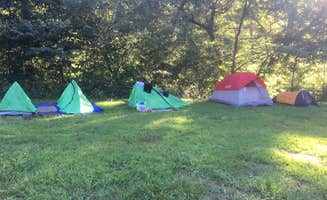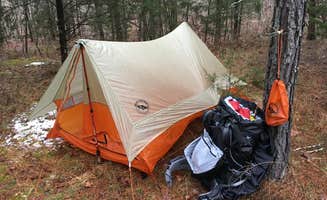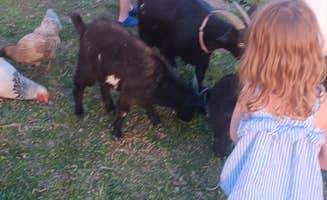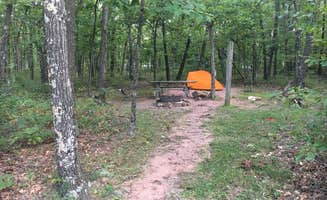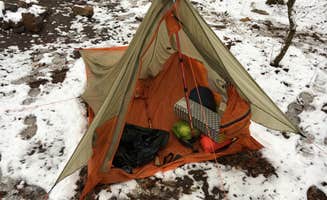Tent camping near Fremont, Missouri centers around the Eleven Point National Wild and Scenic River, which flows through Mark Twain National Forest at elevations between 500-1,000 feet. This Ozark region receives approximately 44 inches of annual rainfall, creating lush forest conditions. Winter temperatures can drop below freezing, while summer highs frequently exceed 90°F with high humidity.
What to do
River activities: Campers at Whitten River Access can use the boat ramp for kayaking on the Eleven Point River. "The Eleven Point River is beautiful and cold. Some of the best outdoor fun for adventurous people," notes Ralph S.
Swimming spots: Cool off during hot months at multiple river access points. A camper at Stinking Pond Float Camp mentioned, "Good place to camp, has a huge cliff you can jump off of, not a bad place to float into and camp overnight."
Fishing opportunities: The cold waters support trout fishing throughout the area. Glen T. observed that McCormack Lake Recreation Area offers "great fishing" and is "a really nice place to go hang out."
Backcountry hiking: The White's Creek Loop in the area provides multi-day hiking options. Tony R. reports at Irish Wilderness: "fun 2 day (three if you need it) hike through whites creek loop. Plan around hitting the two springs on both legs of the 20 mile loop."
What campers like
Solitude and quiet: Weekdays offer particularly peaceful camping experiences. Delanie J. shared about McCormack Lake Recreation Area: "Some people showed up for day use, but the sites were empty. Totally alone with a gorgeous lake."
Natural springs: Several campsites feature clear springs with unique formations. William M. noted at Boze Mill Float Camp: "There is a beautiful blue spring coming out of the bottom of a pool formerly used to power Boze Mill."
Fall colors: The changing leaf colors make autumn a prime time for camping in this region. Charlotte B. recommends: "Our favorite time to go is in the fall when the leaves begin to change. The water may be chilly, but the views and the fishing are perfect."
Wildlife viewing: The forests and waterways support diverse wildlife. Meghan B. described her experience: "The spot was peaceful and full of chirping birds and frogs."
What you should know
Road conditions: Many access roads require vehicles with adequate clearance. Ralph S. cautioned about Whitten River Access: "The road in is rough gravel and a big rv will be slow going. However, I've seen so good size rv's there."
Winter conditions: Tent camping remains possible year-round, but prepare for freezing temperatures. Linda C. shared: "Arrived after dark. Found a level spot by the river, ground was frozen or it would have been muddy. No one around on this 5 degrees F night."
Campsite facilities: Most sites offer very basic amenities. Glen T. noted: "The only issue is the restroom is a little walk from the campsites."
Navigation challenges: Some backcountry areas require careful navigation. Tony R. advises: "BRING A GPS! The trail is very easy to lose and after 20+ miles you'll want the comfort of knowing where you have been/are going!"
Tips for camping with families
Water safety: River areas with varying depths are available for different swimming abilities. Kaylee D. from Turner's Mill shared: "River access and super close to stream/cave/waterfall area. Water from the cave is so fresh and clear!"
Insect protection: The riverfront areas can have significant mosquito activity. Charlotte B. advises: "I do suggest lots of bug spray. For some reason, I always get eaten up by mosquitos in this area."
Educational opportunities: Historical mill sites provide learning experiences. Ashley W. described Turner's Mill as an "Awesome mill you can climb on and awesome spring that makes individual pools."
Lake alternatives: For families wanting calmer waters, lake options exist. McCormack Lake offers fishing and swimming without river currents, though water quality varies seasonally.
Tips from RVers
Remote site access: RV camping options are limited and challenging to access. Marty C. from Jerktail Landing warned: "This is a very remote primitive campsite along the river and down seven and a half miles rough gravel roads. Probably not a good idea to try to bring large camping units to this site."
Water crossing awareness: Some access roads may have small water crossings after heavy rains. Consider visiting during dry periods for easier access with larger vehicles.
Site leveling: Prepare leveling equipment as many sites are not graded flat. While natural clearings exist for tents and small RVs, most locations were not designed specifically for recreational vehicles.


